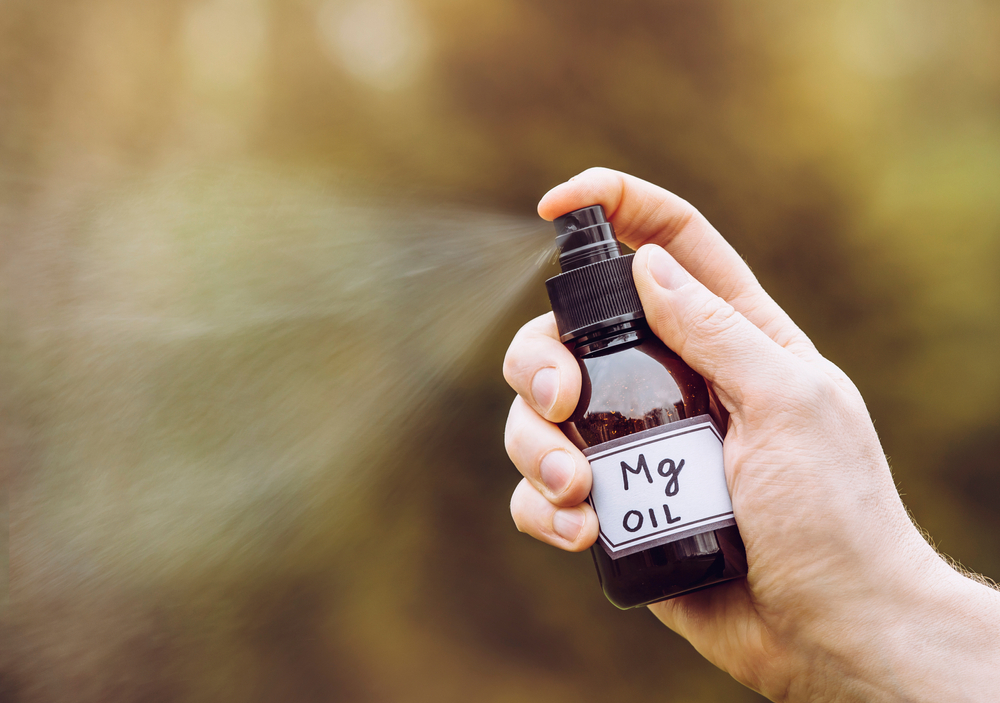Magnesium is a mineral essential for many bodily functions. For example, it helps with muscle movement, nerve function, and maintaining healthy blood sugar and blood pressure levels. Oral magnesium supplements are commonly used to aid sleep, anxiety, and constipation. It’s also found in foods like seeds, legumes, and vegetables. However, you may have seen magnesium oil products intended for topical use. Despite people touting its many benefits, research is limited on their efficacy.
Magnesium oil vs supplements

First off, it’s important to note that supplements and similar items are not regulated. Therefore, quality can greatly differ depending on the brand. So look for labels with third-party lab certifications that verify safety, potency, and purity. But even the best versions of magnesium oil — whether in the form of spray, cream, lotion, or gel — may not have the intended effect. In fact, it may have no effect at all, as research is limited on the subject, according to a review in the journal Nutrients. Although the benefits of oral supplementation have been well-studied and confirmed, topical use lacks the same documentation. However, anecdotal evidence and small studies back the oils and sprays’ popularity.
Magnesium oil benefits

The biggest draw of transdermal magnesium is that it sidesteps the laxative effect of oral capsules. People use the oil to ease pain, improve sleep quality, reduce dermal inflammation, relieve stress, relieve muscle cramps and soreness, and aid digestive health. Although oral supplements have been shown to help these issues, small studies show that oil or spray can also benefit certain conditions.
Read More: Boosting Magnesium Levels Could Slow Brain Aging and Lower Dementia Risk, Research Shows
Ease nerve damage and fibromyalgia

For instance, a small pilot study indicated that spraying magnesium oil onto skin can ease peripheral neuropathy (nerve damage and pain) associated with chronic kidney disease. Another study with 24 patients indicated that magnesium chloride spray can benefit people with fibromyalgia, a chronic condition that causes pain, stiffness, fatigue, and sleep issues. The participants reported improved symptoms after a few weeks of using the spray daily.
May ease restless leg syndrome

In the same vein, another common claim is that the oil can ease restless leg syndrome. “…Magnesium blocks NMDA receptors, which also leads to the blocking of calcium into muscle cells,” says Joaquin Villegas, MD, MPH, a family medicine physician and an assistant professor at McGovern Medical School, to Everyday Health. “That causes the muscle to relax and can provide some relief.” Small studies indicate that oral magnesium supplemetation can improve sleep quality and symptoms of restless leg syndrome, but no research has been done on the effects of topical spray.
Read More: How a Diet High in Magnesium Might Impact Dementia Risk
May relieve headaches and migraines

Research has linked magnesium deficiency to mild and moderate tension-related headaches and migraines. “Magnesium supplementation is useful in the prevention of migraines, since low levels of magnesium cause easier activation of NMDA receptors, which are part of the migraine activation pathway,” says Villegas. “Also, low levels of magnesium have been linked to blood vessel narrowing in the brain, which is believed to be a cause of migraines.” Again, no studies have been conducted to prove that topical sprays can offer these benefits.
Magnesium oil for feet and sleep

Although evidence is mixed on magnesium’s overall effect on sleep quality, this potential benefit has drawn magnesium oil into the spotlight. One noteworthy promoter of the practice is plastic surgeon Daniel Barrett, MD. In March 2024, he posted a video where he rubbed his feet with it and fell asleep within 20 minutes. However, there have been no studies to verify this benefit. The theory is that the body absorbs the mineral through the skin and into the bloodstream.
Read More: Can Adding Magnesium To Your Diet Help Regulate Blood Pressure?
Best way to apply magnesium oil on feet

According to Health, it’s important to test products on a small patch of skin before applying it to the entire foot. Some people have negative reactions such as burning or stinging sensations. But if you clear the test, ensure your feet are clean, dry, and clear of sweat and other topical products. This will help the body absorb as much of the mineral as possible. Do not apply it to open wounds since this can irritate the site and interfere with its healing. Apply or spray the magnesium oil and massage it into skin to help with the blood flow and absorption. Put it on right before bed if you want it to help you sleep. Speak to your doctor to determine the best dose and frequency of application, and read the label carefully before trying it. Remember to look for third-party testing certifications.
Sources of magnesium

Many Americans don’t consume enough magnesium in their regular diet. In fact, some groups are at a higher risk of magnesium inadequacy, such as those with type 2 diabetes, gastrointestinal disease, and alcoholism. Generally speaking, it’s best to consume minerals from foods rather than supplements because they often come alongside nutrients that can aid absorption and come with their own health benefits. Speak to your healthcare provider about how to improve your magnesium intake or if you would benefit from supplementation. According to the National Institutes of Health, foods high in this mineral include:
- Pumpkin seeds, chia seeds, and other seeds
- Almonds and other nuts
- Spinach
- Edamame and soy products
- Black beans, peanuts, and other legumes
- Potatoes
- Brown rice
- Avocado
- Salmon
Disclaimer: This information is not intended to be a substitute for professional medical advice, diagnosis or treatment and is for information only. Always seek the advice of your physician or another qualified health provider with any questions about your medical condition and/or current medication. Do not disregard professional medical advice or delay seeking advice or treatment because of something you have read here.
Read More: 7 Types of Magnesium and How They Can Be Used to Improve Your Health

